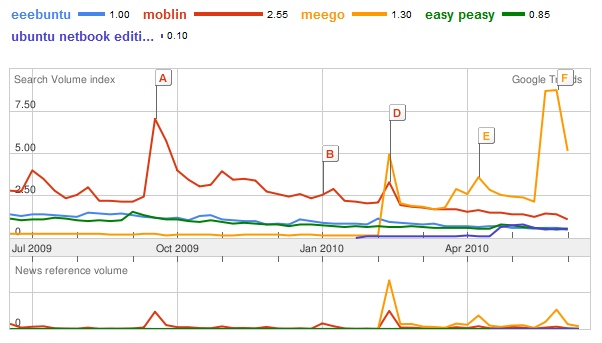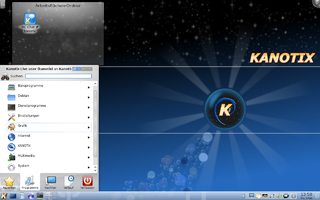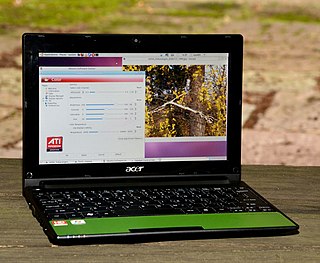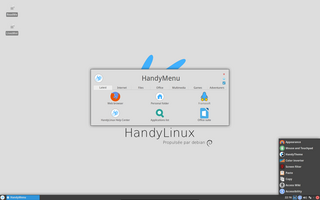Comparison
Features
| Distribution | Working State | Aim | Creator | Producer | Base Distribution | Installed Size (MB) | Initial Release Date | Interface | Linux Kernel | Default File System | Architecture Support | Approximate Number of Pre-compiled Packages | Default Package Management Tools | Default Installer |
|---|---|---|---|---|---|---|---|---|---|---|---|---|---|---|
| Aurora | 2009 Last Release, development stopped | Asus Eee PC optimized | Eeebuntu community | Ubuntu | 2009-05-15 | Gnome or Gnome + Netbook Remix | Array kernel (modified kernel) [2] | APT | ||||||
| CrunchBang Linux 11-20130119 | 2015-02-06 Development Stopped | Limited hardware machines | Philip Newborough | Debian | 2013-01-19 | Openbox | 3.2.35 | x86 + x86_64 | APT | |||||
| Debian Eee PC | Asus Eee PC | Debian | ||||||||||||
| Debian Wheezy | Written from scratch | i386, AMD64, PowerPC, SPARC, ARM, MIPS, S390, armhf, s390x. Loongson [3] | ||||||||||||
| EasyPeasy 1.6 | 2012 Last Release, development stopped | All netbooks | EasyPeasy Community | Jon Ramvi | Ubuntu | 2010-04-24 | Gnome + Netbook Remix | 2.6.32 | ext4 | x86 | APT | Ubiquity | ||
| Eeedora [4] | Asus Eee PC 701 | Martin Andrews | Fedora | Xfce | RPM | |||||||||
| Firefly Linux 1.0 Beta 1 | 2009 Last Release, development stopped | Firefly Linux community | Arch Linux | LXDE | 2.6.29.4 | x86 | Pacman | |||||||
| Fuduntu | 2013-04-14 Last Release, development stopped | All netbooks [5] | Andrew Wyatt "Fewt" | Fuduntu.org [5] | None (Originally based on Fedora 14) | 2012-10-01 | Gnome | 3.6.9 | ext4 | x86 [6] + x86_64 [7] | RPM + YUM | |||
| gNewSense | Free software | Brian Brazil and Paul O'Malley | Sam Geeraerts with sponsorship from the FSF | Debian | Linux-libre 2.6.32 | Loongson, x86, x86-64 | APT | Ubiquity (software) | ||||||
| Joli OS 1.2 (formerly named Jolicloud) | 2013-11-22 Last Release, development stopped | All netbooks [8] | Joli OS | Joli OS | Ubuntu | 2011-03-09 | HTML5 + Gnome | 2.6.35.10 | ext4 | x86 | APT | |||
| Kuki Linux 2.0 | 2009 Last Release, development stopped | Aspire One optimized | Kuki Linux community | Ubuntu | Xfce | |||||||||
| Linux4One 1.5 | Aspire One optimized | Linux4One community | Ubuntu | Gnome or LXDE | ||||||||||
| Leeenux Linux v10 | 2016 Last Release | All netbooks | Aleksandar Ciric | Ubuntu 16.04 LTS | LXDE, XFCE | ext4 | x86, AMD64 | APT, Synaptic, Software center | Ubiquity | |||||
| Leeenux 2020 | Supported until April 2023 | All netbooks | Aleksandar Ciric | Ubuntu 18.04 LTS | LXDE, XFCE | x86, AMD64 | APT, Synaptic, Software center | |||||||
| Lubuntu 15.10 | 2015-10-22 Active Development | Limited hardware machines | Lubuntu Community and LXDE Foundation | Ubuntu | 2011-10-13 | LXDE | Synaptic | |||||||
| Manjaro Netbook Edition [9] | 2015-07-25 Active Development | All netbooks | Rob McCathie | Manjaro Linux | Arch Linux | Xfce | Intel Atom-optimized Manjaro kernel | ext4 | x86, x86_64 | Pamac (graphical frontend for pacman) | ||||
| Midinux | All netbooks | Red Flag Linux | 2007 | ext3 | x86 | |||||||||
| MeeGo 1.2 | 2012 Last Release, development stopped | Intel Atom processor netbooks, Nokia ARM smartphones | Intel, Nokia, Maemo community | Intel, Nokia, Linux Foundation | None (it is a distribution developed out of Maemo and Moblin) | 2010-10-28 | "Netbook User Experience" (based on Clutter) | 2.6.35 | btrfs | x86 with SSSE3 support | RPM | |||
| Moblin 2.1 | 2009-04 Last Release, development stopped | All Intel Atom processor netbooks and MID | Intel | Intel/Linux Foundation | None (borrows components for various distributions [10] ) | 2009-11-04 | Clutter | RPM (may change [10] ) | ||||||
| OpenGeeeU 8.10 | 2012-08 Last Release, development stopped | Luca De Marini | Easy Peasy [11] | 2009-03-23 | Enlightenment plus Gnome | 2.6.27 | ext3 | x86 | 26000 | APT | Ubiquity | |||
| Puppeee Linux 4.3X | Linpus is 64-bit only | Asus Eee PCs with Intel Chipsets | Jemimah Ruhala | Puppy Linux 4.3.1 | 200MB | Choice of IceWM / OpenBox / Flwm with ROX-Filer / PcManFM / LxLauncher | 2.6.33 | AUFS + SquashFS + EXT2 | Atom / CeleronM | Pet | PetGet | |||
| Trisquel Mini | 2014-11 Last Release, development stopped | Limited hardware machines | Trisquel | 2010-09 | ||||||||||
| Ubuntu Netbook Edition 10.10 | 2010-10 Last Release, development stopped | Intel Atom processor netbooks [12] | Canonical Ltd. | Canonical Ltd. | Ubuntu | 2010-10-10 | Unity | 2.6.32 | x86 | 32000 | APT | |||
| Distribution | Working State | Aim | Creator | Producer | Base Distribution | Installed Size (MB) | Initial Release Date | Interface | Linux Kernel | Default File System | Architecture Support | Approximate Number of Pre-compiled Packages | Default Package Management Tools | Default Installer |
Specific Features
| Distribution | Target Boot Time | Whole OS Loads to RAM (Default) | LIVE Medium | Target Users | SSD Write Optimization (SSD degradation, I/O optimization, etc.) | Specific Supported Hardware |
|---|---|---|---|---|---|---|
| Aurora 3.0 | ||||||
| EasyPeasy 1.6 | LIVE Medium | Beginner, highly mobile netbook users. | ||||
| Eeedora [4] | ||||||
| Firefly Linux 1.0 Beta 1 | ||||||
| Joli OS 1.2 | ||||||
| Kuki Linux 2.0 | ||||||
| Linux4One 1.5 | 40 seconds [13] | |||||
| Manjaro Netbook Edition | ||||||
| Moblin 2.0 | 5 seconds [14] [15] | |||||
| OpenGeeeU 8.10 | ||||||
| Puppeee Linux 4.3X | 30s | Loads to RAM | Layered filesystem - caches writes in RAM | Lightweight kernel compiled for EeePCs only | ||
| Ubuntu Netbook Edition 10.10 |
Google Trends
While no public numbers measuring the install-base of these operating systems are available, Google Trends data on a handful of them indicate their relative popularity:












